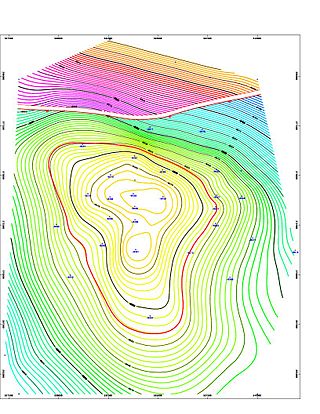
The Mozambique Channel is an arm of the Indian Ocean located between the Southeast African countries of Madagascar and Mozambique. The channel is about 1,700 km long and 419 km across at its narrowest point, and reaches a depth of 3,292 m (10,801 ft) about 230 km off the coast of Mozambique. A warm current, the Mozambique Current, flows in a southward direction in the channel, leading into the Agulhas Current off the east coast of Southern Africa.

Petroleum engineering is a field of engineering concerned with the activities related to the production of hydrocarbons, which can be either crude oil or natural gas. Exploration and production are deemed to fall within the upstream sector of the oil and gas industry. Exploration, by earth scientists, and petroleum engineering are the oil and gas industry's two main subsurface disciplines, which focus on maximizing economic recovery of hydrocarbons from subsurface reservoirs. Petroleum geology and geophysics focus on provision of a static description of the hydrocarbon reservoir rock, while petroleum engineering focuses on estimation of the recoverable volume of this resource using a detailed understanding of the physical behavior of oil, water and gas within porous rock at very high pressure.
ABET , formerly known as the Accreditation Board for Engineering and Technology, Inc., is a non-governmental accreditation organization for post-secondary programs in engineering, engineering technology, computing, and applied and natural sciences.

Hydrocarbon exploration is the search by petroleum geologists and geophysicists for deposits of hydrocarbons, particularly petroleum and natural gas, in the Earth's crust using petroleum geology.

The Society of Petroleum Engineers (SPE) is a 501(c)(3) not-for-profit professional organization.

The American Society for Engineering Education (ASEE) is a non-profit member association, founded in 1893, dedicated to promoting and improving engineering and engineering technology education. The purpose of ASEE is the advancement of education in all of its functions which pertain to engineering and allied branches of science and technology, including the processes of teaching and learning, counseling, research, extension services and public relations. ASEE administers the engineering technology honor society Tau Alpha Pi.
The Energy Institute (EI) is a professional organization for engineers and other professionals in energy-related fields. The EI was formed in 2003 by the merger of the Institute of Petroleum (dating back to 1913) and the Institute of Energy (dating back to 1925). It has an international membership of about 20,000 people and 200 companies. Its main office is at 61 New Cavendish Street, London. EI is a registered charity with a Royal Charter.
Drilling engineering is a subset of petroleum engineering.

The Technical University of Crete is a state university under the supervision of the Greek Ministry of Education which was founded in 1977 in Chania, Crete. The first students were admitted in 1984. The purpose of the institution is to conduct research, to provide under-graduate and graduate educational programs in modern engineering fields as well as to develop links with the Greek industry. It is highly ranked among the Greek technical universities in terms of research productivity, research funding, scientific publications and citation per faculty member. It uses Daedalus as part of the emblem.

The Edward E. Whitacre Jr. College of Engineering is the college of engineering at Texas Tech University in Lubbock, Texas. The engineering program has existed at Texas Tech University since 1925. Additionally, the Whitacre College of Engineering administers graduate engineering degree programs at the university's campus in Amarillo, Texas. Many of the college's degree programs are accredited by ABET. The Whitacre College of Engineering is the first and, presently, only school in the world to offer a doctor of philosophy degree in wind science and engineering.
The Federal University of Petroleum Resources Effurun (FUPRE) in Delta State, Nigeria was established and approved during the Federal Executive Council meeting of 14 March 2007 and admitted its first set of undergraduates in 2008.
Vladimir Haensel was an American chemical engineer who invented the platforming process - a platinum catalytic process for reforming petroleum hydrocarbons into gasoline. In addition, he was influential in the creation of catalytic converters for automobiles.
Nimi Barigha-Amange is a former Senator for the Bayelsa East constituency of Bayelsa State, Nigeria. He took office on 29 May 2007 serving until 29 May 2011. He is a member of the People's Democratic Party (PDP).
Mukul M. Sharma is a professor who holds the W. A. "Tex" Moncrief, Jr. Centennial Chair in the Hildebrand Department of Petroleum and Geosystems Engineering at the University of Texas at Austin. He received a B. Tech. degree from the Indian Institute of Technology Kanpur (1980) and then M.Sc. and Ph.D. degrees from University of Southern California in 1981 and 1985 respectively. He has been on the faculty at the University of Texas for the past 39 years and served as chairman of the department from 2001 to 2005.
Geoprofessions is a term coined by the Geoprofessional Business Association to connote various technical disciplines that involve engineering, earth and environmental services applied to below-ground ("subsurface"), ground-surface, and ground-surface-connected conditions, structures, or formations. The principal disciplines include, as major categories:
Donald Laverne Katz was an American chemist and chemical engineer.
André Georges Journel is a French American engineer who excelled in formulating and promoting geostatistics in the earth sciences and engineering, first from the Centre of Mathematical Morphology in Fontainebleau, France and later from Stanford University.
Miller and Mochen, Ltd. is a petroleum consulting company based in Houston, Texas. The firm provides services including reserves certifications, audits, and independent evaluations. They prepare evaluations according to the standards of the United States Securities and Exchange Commission (SEC) Regulation S-X and the Petroleum Resources Management System (PRMS) published by the Society of Petroleum Engineers (SPE).
William Elgein Wickenden was the third president of Case School of Applied Science, now Case Western Reserve University.

Oil and gas reserves denote discovered quantities of crude oil and natural gas that can be profitably produced/recovered from an approved development. Oil and gas reserves tied to approved operational plans filed on the day of reserves reporting are also sensitive to fluctuating global market pricing. The remaining resource estimates are likely sub-commercial and may still be under appraisal with the potential to be technically recoverable once commercially established. Natural gas is frequently associated with oil directly and gas reserves are commonly quoted in barrels of oil equivalent (BOE). Consequently, both oil and gas reserves, as well as resource estimates, follow the same reporting guidelines, and are referred to collectively hereinafter as oil & gas.







